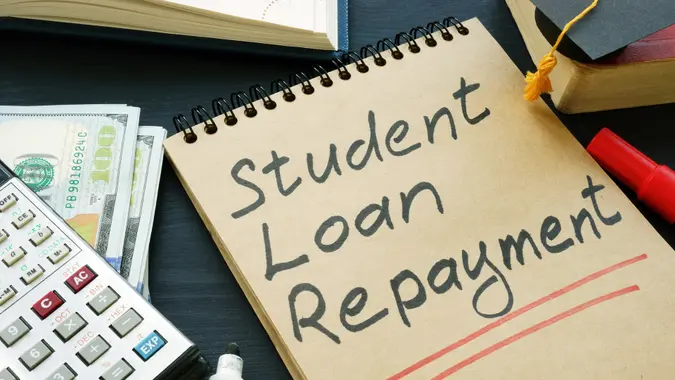How To Consolidate Student Loans for a Lower Monthly Payment

Commitment to Our Readers
GOBankingRates' editorial team is committed to bringing you unbiased reviews and information. We use data-driven methodologies to evaluate financial products and services - our reviews and ratings are not influenced by advertisers. You can read more about our editorial guidelines and our products and services review methodology.

20 Years
Helping You Live Richer

Reviewed
by Experts

Trusted by
Millions of Readers
Managing student loans can quickly become a burden when you have multiple payments to cover every month. One way to streamline this is to consolidate your student loans.
If you are unsure how to consolidate student loans or are unfamiliar with the steps, read on.
What Is Student Loan Consolidation?
Student loan consolidation is the process of combining multiple loans into a single loan with one monthly payment.
Depending on your student loan type, you can either consolidate your loan through a Federal Direct Consolidation Loan or private student loan refinancing. The latter also works if you have a mix of federal and private student loans.
Although consolidation is a great way to simplify your loan approach, it does not erase your debt. Rather, consolidated loans streamline the process by allowing you to make one smaller payment rather than multiple ones throughout the month.
Benefits of Consolidating Student Loans
There are many benefits to consolidating your student loans. These include:
Streamlined Payment Process
Managing multiple payments can become troublesome if you do not have a process to manage your expenses. With a consolidated loan, you get one monthly bill that you can pay off instead of multiple.
One Lower Monthly Payment
Extending the loan term can reduce your monthly costs because they will spread evenly over time and give you more financial flexibility.
Fixed Interest Rates
If you opt for a federal consolidated loan, you can combine them into one loan with a fixed interest rate. The interest rate on your loans is based on their weighted average per the government’s Student Aid website.
New Repayment Plans
If you are seeking income-driven repayment plans, some of these may require that you seek consolidation.
Loan Forgiveness Eligibility
Public Service Loan Forgiveness may require student loan consolidation.
Federal vs. Private Loan Consolidation
| Feature | Federal Consolidation | Private Refinancing |
|---|---|---|
| Eligible loans | Federal only | Federal and private |
| Interest rate | Fixed, based on current rates | New rate based on credit |
| Repayment term | Up to 30 years | 5-20 years |
| Key benefit | Access to forgiveness and repayment plans | Lower interest possible |
| Credit check | No | Yes |
Tip
Refinancing a federal loan with a private lender may affect any benefits you receive from your federal loans and your eligibility for loan forgiveness.
How To Consolidate Federal Student Loans
Applying to consolidate your federal student loans is a relatively straightforward process, as outlined below:
- Visit StudentAid.gov and log in to your account to access the application.
- Apply for a Direct Consolidation Loan, which is visible at the top of the page.
- Choose a loan servicer and a repayment plan.
- Review the terms and submit your application.
- Keep making payments until your new loan is processed — this usually takes 30-60 days.
How To Consolidate Private Student Loans
Here’s what you should do are you’re preparing to consolidate a private student loan.
Maintain a High Credit Score
Higher credit scores mean better rates and terms. A credit score of 670 or above is a good place to start for the best rates.
Compare Lenders
It’s essential to compare loan servicers to find the best terms. Look at interest rates, loan terms and benefits. The U.S. Department of Education is the lender for federal student loans, but it may also use loan servicers.
Apply for Refinancing
You’ll need standard documents like proof of income, loan details and potentially a cosigner to apply for refinancing.
Accept Your Offer
Accept the best offer and sign your new loan agreement.
Stay On Top of Your Payments
Continue making payments on your old loans until the new lender pays them off.
Pros and Cons of Student Loan Consolidation
There are numerous benefits to consolidating your student loans, but there are caveats as well:
Pros
- With consolidated loans, you only have to make a single payment every month on all of your student loans. You don’t need to keep track of the multiple payments and risk missing one, which can lead to issues later.
- The consolidated loan interest rate may be much lower than what you pay for separate loans. This gives you more flexibility when you have other monthly payments to consider.
- Taking a consolidated student loan helps increase your eligibility for loan forgiveness.
- Federal consolidated student loans have fixed interest rates that won’t fluctuate depending on external circumstances.
Cons
- If your consolidated loan incurs extended repayments, a consolidated loan means that you may need to pay more over time than your initial loan term.
- If you opt for private loan refinancing, you will lose any current and potential benefits from your existing federal loan.
- You may also lose additional benefits from your initial loans, like interest rate discounts.
- A consolidated loan means a hard inquiry into your credit history, which may temporarily cause a dip in your credit score. If your score is low, this can create issues later.
When Should You Consolidate Student Loans?
Consolidating student loans is an excellent option for some people, but it may not be the best option for you. Below are some factors to consider if you are thinking of getting a consolidated student loan:
Reasons to Consolidate
One reason to consider consolidating your loans is if you have multiple federal loans that have become burdensome in terms of repayment. Consolidation removes the guesswork and turns these payments into one smooth transaction every month.
If you have an unstable income and want to qualify for income-driven payment, consolidation may be the best option to reach your goals. This also applies if you are seeking a PSLF.
Finally, if you have multiple private loans that are breaking the bank with interest rates, you may potentially get a lower interest rate through consolidation.
Remember that every person’s circumstances differ depending on how many loans they have, the loan amount, interest rates, terms and credit strength.
When You Shouldn’t Consolidate
In some cases, consolidating your loan may end up becoming more harmful in the long run. For example, when your existing interest rate is already low. If you are only seeking convenience, you may not have considered that the interest may be higher.
In other cases, you may be close to paying off your existing loans. If you get a consolidated loan, you may need more time to pay it off or pay more to do so, which is not a wise financial direction to take in the name of convenience.
If you have a federal loan and receive benefits, consolidating your loan using a private lender leads to losing your benefits.
As with all things, weighing the pros and cons of consolidating your loan based on your expectations and circumstances is a must to meet your financial goals.
Final Take
Consolidating your student loans is a straightforward option to combine all your loans and make one easy payment every month. Knowing how to consolidate student loans and the pros and cons of taking on the process helps you better manage your money and make financial decisions that offer you flexibility.
Although they come with many benefits, some consumers may not need to consolidate their loans, especially if they already have low interest rates or are close to paying off the entirety of the loan.
Knowing what to expect can save you hassle and money in the long run when it comes to student loan consolidation.
FAQs on How To Consolidate Student Loans
Here are answers to some of the most frequently asked questions about consolidating student loans.- Does student loan consolidation lower my interest rate?
- While it's not guaranteed, student loan consolidation may sometimes lower your interest rate. A federal loan takes an average of your existing loans that you're choosing to consolidate. On the other hand, consolidating a private loan could potentially move your loan to a lower interest rate, depending on your credit score, debt-to-income ratio and your income.
- Can I consolidate private and federal student loans together?
- You cannot consolidate private and federal loans, but they can be refinanced. The reason is that private loan consolidation interest rates depend on your credit score, while federal loan consolidation is based on the weighted average of your loans.
- Does consolidation affect my credit score?
- Your credit score may take a slight dip after consolidation since it leads to a hard inquiry into your credit history. However, consolidation may eventually improve your credit score if you make timely payments and manage your other expenses accordingly. It can also harm your credit score if you cannot keep up with the monthly payments.
- Will I lose loan forgiveness options if I refinance?
- Yes. If you refinance your federal student loan by using a private lender, you will lose the benefits that come with your federal student loan, including federal loan forgiveness programs. While this may not matter if you don't have a large amount left to pay, it can lead to you paying back more than you needed to.
- How long does student loan consolidation take?
- It usually takes up to six weeks from the day you submit your application for the consolidation to take effect. In the meantime, you must still make the payments on your other loans until you have your newly consolidated loan.
Our in-house research team and on-site financial experts work together to create content that’s accurate, impartial, and up to date. We fact-check every single statistic, quote and fact using trusted primary resources to make sure the information we provide is correct. You can learn more about GOBankingRates’ processes and standards in our editorial policy.
- Consumer Financial Protection Bureau. 2024. "Should I consolidate or refinance my student loans?"
- Federal Student Aid. "Should I consolidate or refinance my student loans?"
- FinAid. "Private Student Loan Consolidation."
- Federal Student Aid. "Consolidating Student Loans."
 Written by
Written by  Edited by
Edited by 

























